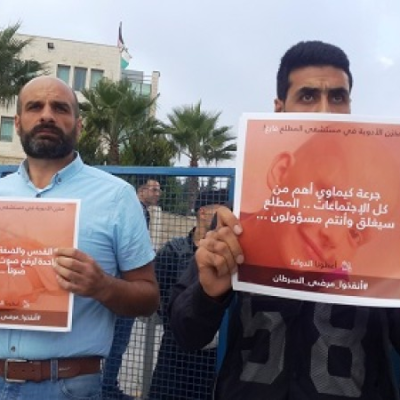
Bethlehem / PNN /
Palestinian sources working in the medical and healthcare services sector have warned of an impending crisis in the Palestinian health sector due to the dire financial conditions of private and civil hospitals. These conditions may lead to the suspension of services provided to the Palestinian Ministry of Health, as a result of accumulating debts owed to the government and the Ministry's adoption of a policy of partial and varied payments to private and civil hospitals. This practice makes it challenging for these hospitals to maintain their services to the government.
For years, the Palestinian government has heavily relied on private hospitals to handle medical referrals to Israel and several other foreign countries, including Israel. However, in the past two years, it has implemented near-total suspension of patient transfers to Israeli hospitals, instead relying on private Palestinian hospitals and some hospitals in Jordan and Egypt for various reasons. The initial expectations were that this decision would have positive repercussions on the private healthcare sector. However, consecutive financial crises faced by the Palestinian government led the Ministry of Health to adopt a borrowing policy for medical referrals from the private health sector, resulting in mounting costs owed to private hospitals by the Palestinian government.
The Palestinian government largely depends on private hospitals due to the inability of the public health sector to cater to all medical needs. There is a shortage of capacity to accommodate all patients in government hospitals, and some medical procedures are carried out in private hospitals due to the lack of these services in public healthcare facilities.
Financial Strain Threatens Palestinian Health Sector: Private Hospitals Face Impending Crisis
Consequently, private hospitals, both civil and private, are facing severe crises due to the financial hardships resulting from the government and Ministry of Health's mounting debts. Estimates indicate that the total amount of debts has reached hundreds of millions of shekels. Each hospital is burdened with tens of millions of shekels in unpaid dues to this day.
According to informed sources from some hospitals, this crisis has negatively affected the level and quality of services provided. Among the consequences are delays in paying salaries to doctors, nurses, and other hospital staff in private and civil hospitals. Some hospitals have been unable to pay regular salaries to their employees in the past two years, leading to several months of delays for these essential and vital sectors.

Furthermore, the sources pointed out that some equipment suppliers and pharmaceutical factories, along with all medical supplies providers, have stopped supplying private and civil hospitals due to their inability to fulfill their financial obligations towards these companies. These companies, in turn, acquire these supplies and import them from abroad, exacerbating the health and medical crisis experienced in Palestinian territories.
According to the information obtained by PNN Palestinian News Network, some private hospitals are currently considering closing down departments that offer vital services to Palestinian citizens due to their inability to sustain operations under these conditions. The hospitals can no longer afford to pay their employees' salaries, leading some of them to consider leaving their positions. Additionally, the suppliers of services have halted providing the necessary medical tools, supplies, and medications.
Palestinian Healthcare in Peril: Private Hospitals Sound Alarm Over Financial Crisis
Hospital administrations have conveyed urgent pleas and requests to the Minister of Health, Minister of Finance, and Prime Minister through the Private Hospitals Union to address the financial situation. They have also urged President Mahmoud Abbas to intervene. It should be noted that these medical and healthcare services face uncertainty, as the hospitals cannot officially announce their discontinuation of services to patients receiving referrals. Simultaneously, they struggle to meet their financial commitments due to the current financial circumstances.
The hospital administrations acknowledge the significant burden on the government and the efforts made to settle these debts. However, they hope that their pleas and messages, and the dire situation, will receive a receptive ear from the officials in the Ministries of Health and Finance. They emphasize that rational financial contributions are necessary to ensure their ability to endure and continue providing services. The current mechanisms for repaying the debts by the government will not resolve the crisis; rather, they may exacerbate the debts and the crisis, which could erupt at any moment, leading to hospital closures, suspension of patient referrals, or the financial collapse of some hospitals. These are outcomes the government and the hospitals strive to avoid.